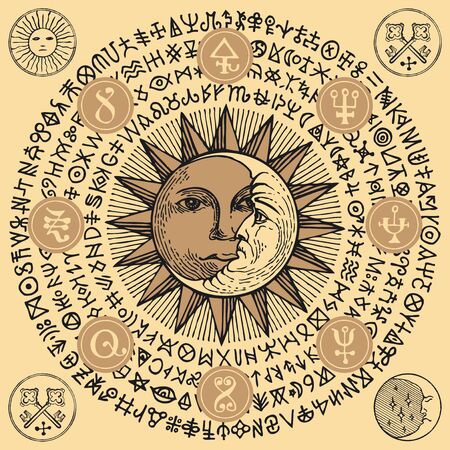Introduction to Indian Rashis
In the vibrant tapestry of Indian culture, astrology holds a unique and respected place, guiding many aspects of daily life and important decisions, especially marriage. Central to Indian astrology are the Rashis, or zodiac signs, which trace their roots back to ancient Vedic traditions. Unlike the Western zodiac system, Indian Rashis are deeply intertwined with lunar positions and are considered essential in understanding an individual’s nature, destiny, and compatibility with others. These twelve Rashis—ranging from Mesha (Aries) to Meena (Pisces)—have shaped beliefs and rituals across generations, influencing everything from naming ceremonies to matchmaking. Even in modern India, where tradition meets technology, the cultural relevance of Rashis endures. Families often consult astrologers before major milestones, and horoscopes remain a key consideration in arranged marriages. Thus, Rashis are not only an astrological concept but a living cultural heritage that continues to shape relationships and societal norms in contemporary India.
2. The Concept of Marriage in Indian Culture
In India, marriage is not just a social contract but is deeply regarded as a sacred union, reflecting the ideals of Dharma (duty), Artha (prosperity), Kama (desire), and Moksha (liberation). Families across diverse regions, from North to South and East to West, treat marriage as a lifelong bond that unites two souls as well as their families. This union is celebrated with grand rituals, each step symbolising spiritual connection and mutual commitment.
Central to Indian matchmaking is the role of astrology, particularly the study of Rashis (zodiac signs) and Janam Kundali (birth charts). Traditionally, families consult astrologers to ensure compatibility between prospective brides and grooms. This astrological analysis is considered crucial for predicting marital harmony, prosperity, and even health prospects. The practice transcends religion and region; whether in Tamil Nadu or Punjab, astrology remains a key part of matrimonial discussions.
Astrology’s Role in Indian Matchmaking
The following table summarises how astrology is woven into the traditional Indian matchmaking process:
| Step | Description | Common Terms Used |
|---|---|---|
| Kundali Matching | Comparing birth charts for 36 Gunas (qualities) | Kundali Milan, Guna Milan |
| Mangal Dosha Check | Assessing Mars’ placement for possible obstacles | Mangal Dosha, Kuja Dosham |
| Dasha Compatibility | Analysing planetary periods influencing married life | Dasha Sandhi, Mahadasha |
| Rashi & Nakshatra Matching | Matching moon signs & constellations for harmony | Rashi Milan, Nakshatra Porutham |
This blend of faith, tradition, and astrological science continues to shape Indian marriages. Even among modern urban youth, horoscopes are often exchanged before wedding talks proceed—showcasing the cultural depth of the belief that marriages are indeed “made in heaven” but matched on earth through careful astrological guidance.

3. Top Indian Rashis: Key Characteristics
Highlighting the Most Prominent Rashis in India
In India, astrology and Rashi (zodiac sign) play an intrinsic role in shaping daily life, relationships, and especially marriage compatibility. Among the twelve Rashis, certain ones are frequently discussed and carry immense cultural significance across regions. Let us delve into some of the most prominent Rashis in Indian society.
Mesha (Aries)
Mesha natives are known for their leadership qualities, assertiveness, and vibrant energy. These individuals are often seen as go-getters who embrace challenges fearlessly. In marital life, they bring enthusiasm and dynamism, but sometimes need to balance their fiery temperament with patience.
Vrishabha (Taurus)
Vrishabha people are grounded, reliable, and value stability above all. Their practical approach to life makes them trustworthy partners. However, their stubbornness can become a challenge if not managed with understanding and flexibility in marriage.
Mithuna (Gemini)
Mithuna individuals are celebrated for their adaptability, wit, and communicative nature. They thrive on intellectual stimulation and enjoy social interactions. In relationships, their versatility is an asset, but restlessness may sometimes disrupt marital harmony if not balanced by emotional commitment.
Karka (Cancer)
Karka natives are deeply emotional, nurturing, and family-oriented. They seek security and comfort within relationships and excel in creating a loving home environment. Their sensitivity can make them vulnerable to mood swings, which requires empathy from their partners.
Simha (Leo)
Simha personalities exude confidence, charisma, and generosity. They take pride in leading and protecting their loved ones. While they offer warmth and loyalty in marriage, their need for admiration should be reciprocated to maintain harmony.
The Influence of Rashi Traits on Marital Life
The unique characteristics of each Rashi influence not only individual personality but also expectations and dynamics within a marriage. In Indian culture, matching Rashis is seen as a way to ensure compatibility in values, temperament, and emotional needs—laying the foundation for a prosperous conjugal life.
4. Marriage Compatibility According to Rashis
In Indian culture, marriage is not just a union of two individuals but also a sacred bond between families and destinies. The concept of matching Rashis (zodiac signs) is integral to this process. Astrological compatibility, often determined through Kundali Milan (horoscope matching), serves as the guiding light for countless families. Let us delve into how different Rashis are matched, the rationale behind Kundali Milan, and the essential factors considered by families and astrologers during this important decision.
The Role of Kundali Milan in Indian Marriages
Kundali Milan is the traditional method used to assess compatibility between prospective brides and grooms. This process involves comparing the birth charts (Kundalis) of both individuals based on their Rashis, Nakshatras (lunar constellations), and planetary positions. The system assigns points, known as Gunas, to various aspects of compatibility. A higher Guna score generally indicates a stronger match.
Key Factors in Astrological Compatibility
- Gana Milan: Determines temperament compatibility (Deva, Manushya, Rakshasa).
- Nadi Dosha: Checks for genetic compatibility to ensure healthy progeny.
- Bhakoot: Analyzes emotional bonding and family harmony.
- Mangal Dosha: Assesses the impact of Mars on marital life, especially regarding conflicts.
- Yoni Matching: Looks at physical and sexual compatibility.
Common Rashi Pairings & Their Compatibility
| Brides Rashi | Grooms Rashi | Compatibility | Cultural Notes |
|---|---|---|---|
| Mesha (Aries) | Kumbha (Aquarius) | High | Dynamic pair, strong partnership potential |
| Tula (Libra) | Mithun (Gemini) | Very High | Cherished for intellectual synergy in North India |
| Kanya (Virgo) | Meena (Pisces) | Moderate | Spiritual depth, valued in South Indian traditions |
| Karka (Cancer) | Makar (Capricorn) | High | Balanced relationship, popular among Gujarati communities |
| Dhanush (Sagittarius) | Sinha (Leo) | Very High | Proud and adventurous pairing; admired across states |
The Family’s Perspective in Compatibility Checks
Apart from astrological calculations, families consider social status, cultural values, linguistic backgrounds, and even regional beliefs before finalising a match. Elders often consult experienced astrologers or pandits who interpret the nuances of each factor. In modern urban India, while some youth may seek personal connection first, the tradition of Kundali Milan still holds immense significance during wedding planning.
This blend of cosmic wisdom with practical considerations makes every Indian marriage unique—rooted in ancient astrology yet adapted to contemporary aspirations.
5. Regional Beliefs and Matrimony Traditions
India’s cultural landscape is a tapestry woven with vibrant threads of regional customs, languages, and rituals. When it comes to marriage, these differences significantly shape the perception of Rashi compatibility and the nature of matrimonial ceremonies. In North India, especially among Punjabi and Hindi-speaking communities, Kundali Milan (horoscope matching) is considered essential before proceeding with any alliance. Here, Rashi and Nakshatra compatibility are thoroughly analyzed by family astrologers, often dictating the auspiciousness of the match.
South Indian Perspectives on Compatibility
In contrast, South Indian states like Tamil Nadu, Karnataka, Andhra Pradesh, and Kerala have their own unique traditions. For instance, in Tamil Nadu, the ‘Porutham’ system assesses up to ten different aspects—more than just the Rashi—to determine marital harmony. Families place immense importance on ‘Dina Porutham’ (day compatibility) and ‘Yoni Porutham’ (nature compatibility). The Malayalam-speaking community in Kerala follows a blend of astrological checks as well as matrilineal customs in some regions.
Eastern & Western Nuances
Bengali weddings in the East emphasize ‘Guna Milan’ but also weave in local beliefs such as seeking blessings from Goddess Durga for a harmonious union. Meanwhile, Gujarati and Maharashtrian families in the West may consult both Rashi compatibility and family priests, yet rituals like ‘Lagna Patrika’ or ‘Muhurat’ hold equal significance alongside astrological matching.
Unity in Diversity: Rituals and Faith
This diversity means that while Rashi remains central to many Indian marriages, its interpretation and importance can vary drastically based on local beliefs. Even within the same linguistic group, village traditions or urban influences might alter how strictly astrology is followed. Ultimately, this rich mix underscores that Indian matrimony is not just about finding astrological alignment but respecting heritage and shared faith in tradition.
6. Modern Perspectives: Bridging Tradition and Contemporary Life
In the rapidly evolving urban centres of India, the balance between traditional Rashi-based marriage compatibility and modern values is an ongoing journey. While elders and families often still consult astrologers to match horoscopes, young Indians in metropolitan cities like Mumbai, Bengaluru, and Delhi are increasingly making decisions that blend astrology with personal choice, education, and career priorities.
The influence of globalisation and exposure to international cultures has encouraged many urban youth to look beyond just Rashi matching. Yet, for many, the comfort of aligning with cultural roots remains strong. This duality has given rise to a new kind of matrimonial approach: couples may review their Rashis out of respect for heritage but ultimately prioritise mutual understanding and shared goals.
Technology also plays a pivotal role in this transformation. Popular Indian matchmaking apps often provide options to filter by Rashi or Nakshatra, but also include interests, lifestyle preferences, and educational background. This reflects the hybrid mindset—where tradition coexists with contemporary aspirations.
Additionally, conversations around gender roles, inter-caste marriages, and LGBTQ+ relationships are gradually reshaping how Indians perceive compatibility. The focus is shifting from rigid astrological guidelines towards holistic compatibility that includes emotional intelligence, communication styles, and life ambitions.
In summary, urban India’s marriage landscape is witnessing a harmonious blend of age-old customs with modern sensibilities. By honouring Rashi-based wisdom while embracing individuality and equality, today’s generation is writing a fresh chapter in the story of Indian matrimony.
7. Conclusion: Finding Harmony in Tradition
In the vibrant tapestry of Indian matrimonial culture, Rashi compatibility remains a significant thread that binds couples and families together. Despite the winds of modernity sweeping across urban and rural landscapes, many still look to Rashis as a guiding light for harmonious unions. This deep-rooted tradition is not merely about astrological charts—it embodies the collective wisdom passed down through generations, reflecting respect for cosmic rhythms and ancestral values. At the same time, contemporary Indian society is seeing a shift towards personal choice, love marriages, and pragmatic considerations alongside traditional practices. Young couples today often blend the insights from Rashi compatibility with their own aspirations, finding a unique balance between age-old customs and evolving ideals. Ultimately, whether one follows the stars closely or embraces a more flexible approach, the essence lies in fostering understanding, respect, and harmony between partners. The enduring relevance of Rashis in Indian marriages showcases how tradition can adapt, remaining meaningful while resonating with modern sensibilities. As India continues to evolve, this dynamic interplay between heritage and progress ensures that marriage remains not just a union of two souls but also a celebration of cultural continuity and shared dreams.


